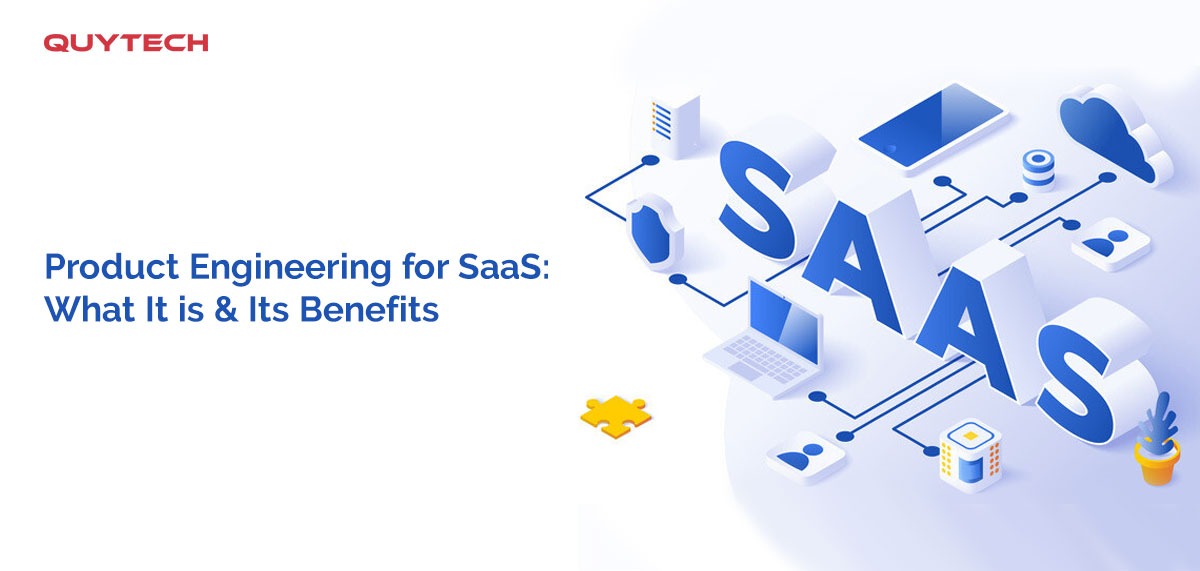Product Engineering is all about designing, developing, experimenting, and launching a software product. The arrival of Web 2.0 technologies and utility-based software performance through Software as a Service (SaaS) has led to the continuous change of client-enabling Saas Development Company service from traditional software engineering to product engineering.
Fostering new engineering standards and technologies has led to the growth of more useful products based on value and quality. According to Data Bridge Market Research, global engineering services are expected to grow at a robust CAGR of 9.25% from 2019 to 2026.
What are the benefits of product engineering for SaaS?
How to find the best SaaS product development services?
Well, if you are looking forward to obtaining the answers to the above, you are in the right place. Here, we will guide you through product engineering for SaaS and its benefits. But before that, let us help you with the important aspects of product engineering for SaaS.
5 Aspects of Product Engineering for SaaS
Be it saas application development or building other products, the process kicks off with idea formation, followed by screening, development, commercialization, and release. So, let us run through these aspects in detail here.

- Idea Formation
This is the beginning stage where the team develops new product ideas. The ideas created shall guide the entire product development method. Hence, it is an important stage that sets the foundation of all the other phases. Some product ideas may include the participation of clients, analysis of competitors, operators, suppliers, and more.
- Screening
It is crucial to screen the ideas presented in the above phase. To make it easy, you can take opinions from your employees, customers, and even clients. This helps you get rid of irrelevant ideas and also may provide you some better inputs.
- Idea Development
Once the ideas are screened, you can determine the possible costs, revenues, and profits resulting from the product.
Businesses need to perform a SWOT analysis (Strengths, Weaknesses, Opportunities, and Threats) to validate their idea. It also helps recognize the target audience and segment the market accordingly. Market segmentation is crucial as it enables you to outstand your competition in a similar niche.
- Product Development
Product development involves the actual design and development of the product. Rather than developing a complete product and launching it, businesses are highly considering developing an MVP first. You, too, can build an MVP for your SaaS product to determine how effective it will be in the market. Depending on the results you receive, you can either choose to modify your MVP or initiate the final Product Engineering Services. This helps you save time, effort, and money.
- Successful Release & Marketing
Once the product is ready, you can announce its successful release. But before that, you must invest your time in marketing. Segment your audience based on the results your MVP provided, and target them with your product offerings. Businesses today, create curiosity among users before the product launch. This attracts a lot of traction. Plan email campaigns, social media ads, and other marketing collateral for a successful product launch.
Benefits of Product Engineering for SaaS

- Scalability
SaaS facilitates active deployment with ready-to-use provisioning and de-provisioning of users from a central administrative console. New users can be up and operating within minutes, opposed to hours or days with on-premise services.
This helps project administrators to reallocate devices quickly to ensure that projects are accomplished on time. Moreover, the cloud’s characteristics allow companies to allocate more compute resources based on high demand. As workloads rise and more users are involved, more devices can be added.
- Security
Sending important data over email or any other medium is a possible security risk. This involves workers’ laptops or any remote computer that needs to download data to run with it. When all data is transferred outside of the company firewall, there is no chance to know its location. The number of available copies can sit on servers and computer hard drives in an unspecified amount of locations.
Uncontrolled copies can also point to inaccurate data variants being used to make business decisions or manufacture components, amounting to millions of dollars in scrap. SaaS applications are guarded by powerful cryptographic cipher series, encrypted area, single sign-on (SSO), two-factor authentication (2FA), and other security standards that go way beyond what most companies can perform on their own.
- Profitability
The SaaS delivery model reduces many IT expenses. Equipment such as workstations, dedicated servers, network support, firewalls, VPN, storage, backups, and failure recovery plans are no longer required – and service costs are significantly decreased. Software maintenance such as downloads, upgrades, services, license codes, and all the troubleshooting and downtime that goes along with those actions are a thing of the past.
SaaS licensing is based on an monthly/annual subscription, shifting the cost from high capital investment to low operating expense, decreasing the total cost of ownership, and lessening financial risk.
- Loyalty
Cloud security is often raised as a concern or the internet interruption could mean that critical software and services are unavailable, and a business may not be able to work while that critical service is offline.
Data is saved and replicated across various geographic areas, and excessive servers are queued, ready to take over a failure occur. Often, a user will not even see an issue as these failover operations automatically take over in milliseconds.
Wrapping Up
The shift from “traditional” software to SaaS product management requires a change in mindset. When building a product using SaaS, make sure you hire the best team with the appropriate skills and values to support product-led growth at your business. If you are in a dilemma concerning product engineering for SaaS, you can always seek assistance of leading CRM Development Company like Quytech which demonstrates years of expertise.
Contact at:
+1-213 493 2650
info@quytech.com
